In keeping with SAMHIN’s mission of greater dialogue on mental health in the South Asians we invited Shreya Vaishnav, PhD, whose interests and expertise are in cross cultural issues and acculturation among other interests, to share about her thoughts and recommendations on Culture Shock that immigrants experience in a new country.
Migrating to the U.S. comes with its own unique set of challenges and emotions. It can be an exciting, overwhelming, and a scary process. Individuals may migrate to a new country because they are forced to move due to unfavorable conditions in their home country or because they choose to move due to a myriad of reasons including career, education, and better opportunities. Regardless of what the reasons are, moving to a new country can impact your mental health in the form of culture shock.
Culture shock is a common phenomenon experienced by immigrants as a result of moving to a new country and having to adapt to a different culture and lifestyle. Understanding culture shock and its impact on your well-being can help you understand your own experience as well as those of your loved ones. Culture shock takes place in four phases:
- Honeymoon phase: This is when the new culture feels exciting and fun. You may feel like a tourist, appreciate the different cultural aspects of being in a new country, and are literally in a honeymoon period.
- Negotiation: This is when you may experience a reality check as you work on transitioning and changing your lifestyle. You may feel frustrated, misunderstood, angry, or low. In this phase, one may experience anxiety, panic attacks, and depressive symptoms as they work on their transition to a new country.
- Adjustment Phase: Individuals begin to set a routine and get accustomed to the new country and its culture. There is a sense of normalcy and individuals begin to make sense of their experiences in a new country.
- Adaptation Phase: In this phase, individuals adapt to the new environment and find ways to integrate their own home culture to that of the new culture. Individuals learn some of the nuanced cultural differences between their home country and the new country and learn to navigate those differences.
Culture shock can manifest itself in different ways and not all phases are experienced by all immigrants in the same manner or time frame. Culture shock can impact your health – physical and mental, and your relationships with your loved ones and colleagues. Therefore, it is important to recognize when you experience culture shock and take the necessary steps to reduce some of the negative impact on your mental health.
Here are a few tips:
- Confide in your loved ones: It is important to talk with someone you can trust about what is going on. Migrating to a new country can be an isolating experience and having the support of your loved ones can make the transition easier.
- Talk to a psychotherapist: Counselors/therapists provide a safe space for you to explore your emotions as they relate to moving to a new country, starting a new job/school, relationships, and many more issues. Therapists are trained to support you in times of distress and can help you by providing the tools you need to explore and work through your experiences. Not everyone needs to see a therapist, but it should be considered when your situation and emotional state warrants it. Learn more about psychotherapy.
- Self-Care: While talking to loved ones and seeing a therapist are all acts of self-care, it is important to continue honoring your body and emotions. Engage in activities that are fun and relaxing. Most importantly, practice self-compassion.
- Build a community of support: Connect with individuals who belong to the same community as you or have similar cultural background. This will help expand your support system and find familiarity in the new country.
Remember that moving to a new country is no easy feat and it will take time to adjust and adapt. You have resources that can help support you with this transition so don’t hesitate to reach out and ask for help!
 By Shreya Vaishnav, PhD, NCC, APCC
By Shreya Vaishnav, PhD, NCC, APCC
Dr. Vaishnav, an immigrant from Mumbai, India is an Associate Professional Clinical Counselor at Silicon Valley Therapy and teaches as an Assistant Professor at Palo Alto University’s Department of Counseling.
Subscribe to SAMHIN’s email list if you would like to be notified when SAMHIN publishes new blog posts.
If you are interested in joining SAMHIN’s mission or have questions about the organization, please contact SAMHIN at [email protected].
Feature image by Nelson Ndongala on Unsplash






